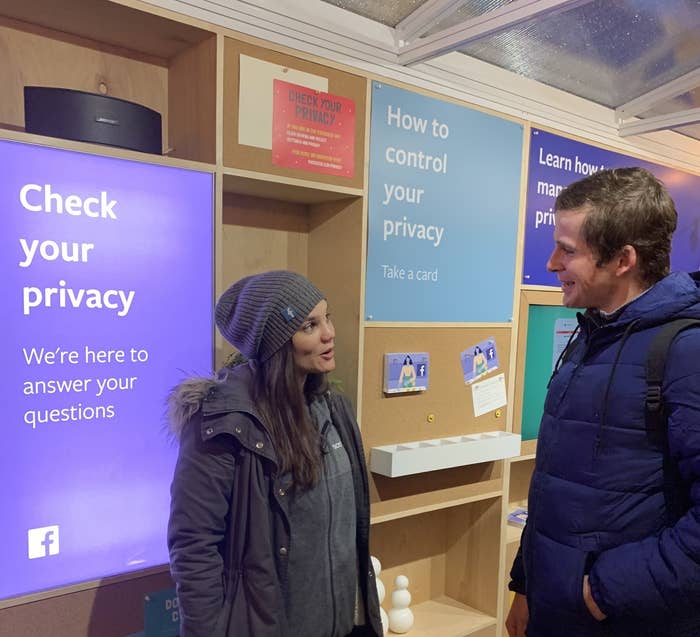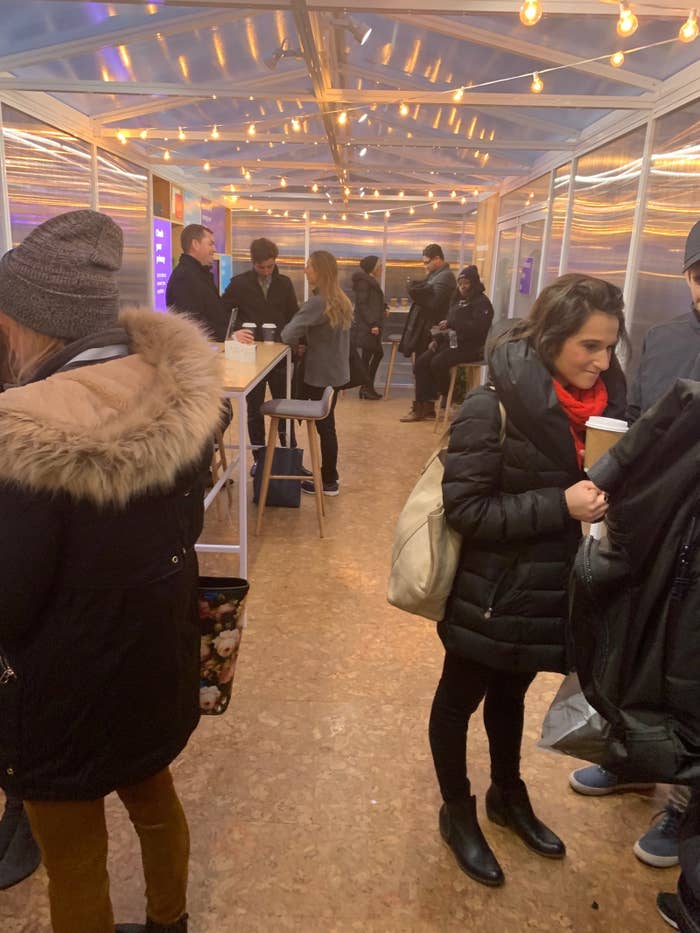
Imagine that you quit Facebook, but not because you find its policies or global impact objectionable in some way. Instead, you left because you simply don’t have any friends or family that you want to keep in touch with. That’s supposedly the reason why Alan, a 21-year-old from New Jersey who dropped by the Facebook privacy “pop-up” in New York City, doesn’t use Facebook.
On Thursday, Facebook set up a one-day space in the middle of Bryant Park in New York City. People could walk in, talk to actual Facebook employees (mostly from the PR and marketing teams), and ask them questions about how to use the privacy and advertising settings on Facebook. There was free hot chocolate with “f”-shaped marshmallows, a few sets of brochures with privacy basics, and screens on the walls with tips.
Bryant Park is lovely during the holidays. There’s an ice-skating rink and an outdoor market with little stalls selling food and gifts (I picked up a pair of novelty socks for my uncle while there). The Facebook pop-up was tucked into one of these stalls in the back of the park; sort of a trailer-sized wood and fiberglass structure. A privacy shed, if you will.

After a brutal year of very bad news for Facebook (wanna feel old? Cambridge Analytica happened THIS YEAR), this friendly shed seemed like Facebook’s attempt at goodwill. Ironically, a day after the pop-up opened, Facebook disclosed that a bug had allowed developers to view people’s photos that hadn’t been fully uploaded or posted to Stories, and that Facebook had kept this secret from users for two months. Imagine that there’s one of those giant dials like on a factory floor in Facebook HQ, for “days without a massive privacy incident,” and this news made them reset it back to “0.”
It’s hard to complain about Facebook and privacy and then sneer when it makes an effort to reach out to people with this pop-up shop. It’s a good thing — it doesn’t do much, but maybe if it helps a few people tweak their settings to feel happier, then hey, net positive. The Facebook employees I chatted with on Thursday told me that most people had come in with pretty basic questions, and that it seemed to be going well. But luring confused holiday shoppers with hot chocolate and then offering a pamphlet about how to find Facebook’s privacy settings is kind of a farce. The truth is that the privacy settings on Facebook ARE fairly easy to access and understand — if you even bother looking for them. The problem with Facebook and privacy isn’t that people don’t know how to toggle the setting for their photos from “Public” to “Friends Only.” It’s the fact that the company has made decisions behind the scenes about how to handle our data in ways that we simply don’t understand.
Alan, the guy with no friends, told me that he used to be on Facebook, but he quit four years ago after he noticed that he got ads for things he mentioned in chats with his friends. The truth is that the Messenger app does NOT scan for ad targeting (it does scan images and messages for child porn or terrorism). When I told him I was pretty sure they don’t scan chats for ads, he refused to believe me. Much like the long-persisting urban legend that Instagram listens to your conversations to target your ads, he believed something sinister was going on — and he’s not unreasonable to think that.
One young woman and her two friends, came in for the free hot chocolate. She uses Facebook to keep in touch with her family back home in another country (she requested to not mention her name or location). She thought the pop-up was pretty cool. “I really love the design and vibes. It’s really personal. It’s Facebook, but I really love it,” she told me.
Two seniors at Bucknell University were more skeptical. “I’m not too happy with them [Facebook], but I still use it, so I can’t complain,” said Adit Acharya, 22. “I use [it] because clubs and stuff from school organizes events on there,” said Lauren O’Connor, also 22. They were both aware of the Cambridge Analytica scandal, although they admitted they weren’t sure of all the technical details (honestly, who is?). They also said there’s an age divide even in their school: Freshman aren’t on Facebook at all. “We’re like the last generation to still use Facebook,” Acharya said. He mainly uses Snapchat, while O’Connor prefers Instagram. “Don’t they also own Instagram?” she asked. (Yes, they do.)
As for Alan with no friends, he told me he does use Instagram — to talk to girls.
